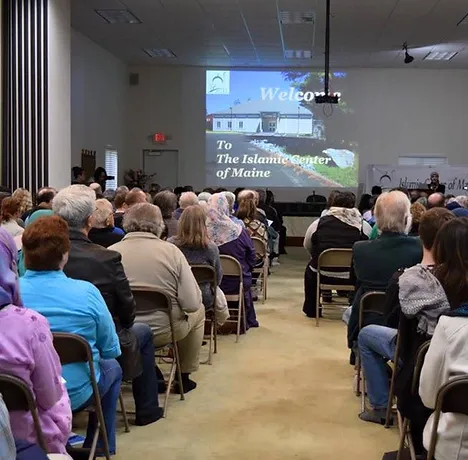
Learn


As your neighbors we are grateful that you have an interest in learning more about Islam. The below information outlines our core beliefs, and shares a bit about what our organization does.

Mosque Etiquette

While visiting the mosque we greatly appreciate your cooperation with mosque etiquette:
- Footwear must be removed upon entering the mosque
- No food or drinks in the prayer hall; you are more than welcome to enjoy food and drinks in the hallways and dining area
- For reasons of modesty, avoid handshakes or physical contact with the opposite gender
- Please place cell phones on silent
- Modest, non-revealing clothes for both men and women

Statement of Beliefs

A Muslim believes in the following 6 articles of Faith:
1. Belief in Allah/One God
A Muslim believes in ONE GOD, God has no father or mother, no son or daughter. None is equal to Him. He is the God of all, the Creator, Lord, Sustainer, and Master of all.
2. Belief in Messengers and Prophets of God
A Muslim believes in all the Messengers and Prophets of God without any discrimination. All messengers were mortals, human beings – protected from sin, endowed with Divine revelations and appointed by God to teach mankind. Some prophets: include Adam, Noah, Abraham, Ishmael, Isaac, Moses, Jesus and Muhammad, the last of the Prophets (peace be upon them all). The key message they came with: believe in One God and not to associate partners with Him, to stay away from sins, lead a life devoted to earning God’s pleasure and accountability on the Day of Judgment.
3. Revelations
A Muslim believes in all scriptures and revelations of God, as they were complete and in their original versions. Muslims believe in the original scriptures that were given to previous messengers; for example David received the Zabur (Psalms), Moses the Torah and Jesus the Injeel (Gospel). However, the previous scriptures do not exist today in the original form in which they were revealed. The Quran is the last testament in the series of divine revelations from God, and Muslims recite and turn to for guidance in all aspects of their life.
4. The Angels
Angels are a creation of God. They are purely spiritual and splendid beings that require no food or drink or sleep. They have no physical desires or material needs. Like other creations of God, Angels spend their time worshiping God. In contrast to human beings, Angels do not have free Will – they can only obey God and do not have the ability to disobey Him. Each Angel is charged with a certain duty. Angels cannot be seen by the naked eyes.
5. The Day of Judgment
A Muslim believes in the Day of the Judgment. This world as we know it will come to an end, and the dead will rise to stand for their final and fair trial. On that day, all men and women from Adam to the last person will be resurrected from the state of death will be held accountable for their deeds. Muslims believe in Heaven and Hell.
6. Predestination
A Muslim believes in the ultimate Knowledge and Power of God to plan and execute His plans. Allah (God) is Wise, Just, and Loving, and whatever He does is good, although we may fail sometimes to understand it fully. The believer should have strong faith in God, recognizing that their own knowledge is limited and their thinking is based on individual consideration. Humans should think, plan and make sound choices and put their trust in God. If things happen as they want they should praise God. If things do not happen as they want they should still praise God, recognizing that He knows best what is good for the affairs of mankind.

5 Pillars of Islam:

1. Shahada
After looking at all of the signs within oneself and in our universe – when the individual who has been given free will (therefore, no compulsion in religion) – comes to the conclusion that there is only One God, he/she states: There is only One God and Muhammad (peace be upon him) is the Final Messenger of God.
2. Salat / Obligatory prayers
Muslims pray 5 times a day at certain times. The set prayers are not just phrases to be spoken. Prayer for a Muslim involves uniting mind, soul, and body in worship; so a Muslim carrying out these prayers will perform a whole series of set movements that go with the words of the prayer. A Muslim prays as if standing in the presence of Allah. In the ritual prayers each individual Muslim is in direct contact with Allah. There is no need of an intermediary.
3. Zakah / Alms –tax
It is not just a form of charity or alms-giving or tax or tithe. Nor is it simply an expression of kindness; it is all of these combined and much more. It is not merely a deduction of a certain percentage from one’s property, but an abundant enrichment and spiritual investment. It is a duty enjoined by God and undertaken by Muslims in the interest of society as a whole. If one does not have the wealth they are not required to give zakah; but, rather, if they are in need, the zakah is given to them.
4. Fasting
A Muslim must fast every day from dawn until sunset for the lunar month of Ramadan, abstaining from food, water (anything ingested), marital sexual relations, bad manners. All those who are healthy, sane, and have reached the age of puberty are required to fast. It is the month when the Holy Quran was revealed to Muhammad (peace be upon him). In this month many Muslims read the whole Quran, pray more often and give a lot of charity. If one is sick they may break their fast and make up the days after Ramadan. Chronically ill individuals do not fast, but rather pay a daily charity to feed the poor – if they can afford it.
5. Hajj / Pilgrimage
Hajj literally means, “to continuously strive to reach one’s goal.” The Hajj, or Pilgrimage to Mecca, is a once-in-a-lifetime obligation for those who have the physical and financial ability to undertake the journey. The Hajj is essentially a re-enactment of the rituals of the great prophets and teachers of faith.
